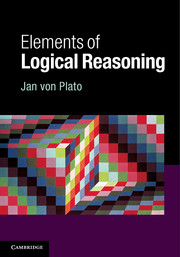Book contents
- Frontmatter
- Contents
- Preface
- PART I First steps in logical reasoning
- 1 Starting points
- 2 Rules of proof
- 3 Natural deduction
- 4 Proof search
- 5 Classical natural deduction
- 6 Proof search in classical logic
- 7 The semantics of propositional logic
- Part II Logical reasoning with the quantifiers
- Part III Beyond pure logic
- Part IV Complementary topics
- Suggestions for the use of this book
- Further reading
- Bibliography
- Index of names
- Index of subjects
3 - Natural deduction
Published online by Cambridge University Press: 05 June 2014
- Frontmatter
- Contents
- Preface
- PART I First steps in logical reasoning
- 1 Starting points
- 2 Rules of proof
- 3 Natural deduction
- 4 Proof search
- 5 Classical natural deduction
- 6 Proof search in classical logic
- 7 The semantics of propositional logic
- Part II Logical reasoning with the quantifiers
- Part III Beyond pure logic
- Part IV Complementary topics
- Suggestions for the use of this book
- Further reading
- Bibliography
- Index of names
- Index of subjects
Summary
The linear variety of natural deduction makes it possible to construct derivations in steps, one after the other. On the other hand, we have not treated disjunction yet, and we have noticed that the normal form of derivations would not be transparent and simple in a linear arrangement of formulas. Both of these defects are corrected when we now turn to a study of Gentzen's original system of natural deduction for propositional logic. Formulas in derivations are arranged in a tree form, such that each formula is either an assumption or the conclusion of exactly one logical rule, and each formula except the endformula of the whole derivation is a premiss of exactly one logical rule. When we here talk about ‘each formula’, we mean more precisely each single formula occurrence in a rule instance in a derivation, but don't repeat that each time.
Tree derivations were in practice a novelty with Gentzen and their wide-spread use in logic derives from his doctoral thesis (1934–5). He took the idea over from the work of Paul Hertz of the 1920s. The tree form shows ‘what depends on what’ in a derivation and makes it possible to transform the order of application of rules; the most central methodological novelty in Gentzen that soon led to spectacular results about the structure of proofs.
- Type
- Chapter
- Information
- Elements of Logical Reasoning , pp. 31 - 63Publisher: Cambridge University PressPrint publication year: 2014



